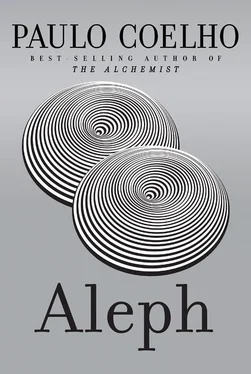“And you, I suppose, think that fine words of love are enough to feed a heart? I know you love your wife, and I understand that, but couldn’t you at least give me some reward for all the Universes I’m placing at your door?”
I turn away. Another idiotic conversation.
THE SHAMAN STARTS THE ENGINE and takes the rudder. We are heading for what looks like a rock about two hundred meters from the shore. I reckon it will take us only a few minutes to get there.
“Now that there’s no turning back, why were you so insistent that I should meet this shaman? It’s the only favor you’ve asked of me on the entire trip, even though you’ve given me so much. I don’t just mean the aikido practice. You’ve helped keep harmony on the train, you’ve translated my words as if they were yours, and yesterday you demonstrated the importance of going into battle simply out of respect for your opponent.”
Yao shakes his head and looks rather uncomfortable, as if he is entirely responsible for the safety of the little boat.
“I just thought, given your interests, that you’d like to meet him.”
This is not a good reply. If I had wanted to meet the shaman, I would have asked. Finally, he looks at me and nods.
“I asked you because I made a promise to come back on my next trip here. I could have come on my own, but I signed a contract with your publishers guaranteeing that I would always be by your side. They wouldn’t like it if I left you alone.”
“I don’t always need people around me, and my publishers wouldn’t have been bothered if you had left me in Irkutsk.”
Night is falling faster than I’d expected. Yao changes the subject.
“The man steering the boat has the ability to speak to my wife. I know he’s not lying, because there are certain things no one else could possibly know. More than that, he saved my daughter. He did what no doctor in the finest hospitals of Moscow, Beijing, Shanghai, or London could do. And he asked for nothing in return, only that I come to see him again. It’s just that this time I’m with you. Maybe I’ll finally learn to understand the things that my brain refuses to accept.”
We are getting closer to the rock now. We should be there in less than a minute.
“That is a good answer. Thank you for trusting me. I am in one of the most beautiful places in the world on an exquisite evening, listening to the waves lapping against the boat. Going to meet this man is just one of the many blessings I have received on this trip.”
Except for the day when he spoke to me of his grief at losing his wife, Yao has never shown any emotion. Now he takes my hand and presses it to his chest. The boat runs ashore on a narrow strip of pebbles, which serves as an anchor.
“Thank you. Thank you very much.”
WE CLIMB UP TO THE TOP of the rock in time to catch a last glimpse of red sky on the horizon. There is nothing but scrub around us, and to the east stand three or four bare trees that have not yet put out their leaves. On one of them are the remains of offerings and the carcass of an animal hanging from a branch. I feel great respect for the old shaman’s wisdom, but he won’t show me anything new, because I have already walked many paths and know that they all lead to the same place. Nevertheless, I can see that he is serious in his intentions, and while he prepares the ritual, I try to remember all I have learned about the role of the shaman in the history of civilization.
IN ANCIENT TIMES, there were always two dominant figures in a tribe. The first was the leader. He would be the bravest member of the tribe, strong enough to defeat any challengers and intelligent enough to foil any conspiracies—power struggles are nothing new; they have been with us since the dawn of time. Once he was established in his position, he became responsible for the protection and well-being of his people in the physical world. With time, what had been a matter of natural selection became subject to corruption, and leadership began to be passed down from father to son, giving way to the principle of perpetuation of power from which emperors, kings, and dictators spring.
More important than the leader, however, was the shaman. Even at the very dawn of humanity, men were already aware of some greater power capable of both giving life and taking it away, although where exactly that power came from they didn’t know. Along with the birth of love came a need to find an answer to the mystery of existence. The first shamans were women, the source of life. Since they did not have to go hunting or fishing, they could devote themselves to contemplation and immerse themselves in the sacred mysteries. The Tradition was always passed on to those who were most able, who lived alone in isolation, and who were usually virgins. They worked on a different plane, balancing the forces of the spiritual world with those of the physical world.
The process was nearly always the same: the shaman used music (usually percussion) to go into a trance, and then would drink and administer potions made from natural substances. Her soul would leave her body and enter the parallel universe. There it would meet with the spirits of plants, animals, the dead, and the living, all existing in a single time that Yao calls qi and I call the Aleph. There, too, she would encounter her guides and be able to balance energies, cure illnesses, bring rain, restore peace, decipher the symbols and signs sent by nature, and punish any individual who was getting in the way of the tribe’s contact with the All. At that time, when tribes had to keep traveling in their constant search for food, it was impossible to build temples or altars. There was only the All, in whose womb the tribe journeyed ever onward.
Like the role of leader, that of shaman also became corrupted. Since the health and protection of the group depended on being in harmony with the forest, the countryside, and nature, the women responsible for that spiritual contact—the soul of the tribe—were invested with great authority, often more even than the leader. At some undefined moment in history (probably after the discovery of agriculture, which brought an end to nomadism), the female gift was usurped by men. Force won out over harmony. The natural qualities of those women were ignored; what mattered was their power.
The next step was to organize shamanism—now entirely male—into a social structure. The first religions came into being. Society had changed and was no longer nomadic, but respect for and fear of the leader and the shaman were rooted in the human soul and would remain so forever. Aware of this, the priests joined ranks with the tribal leaders in order to keep the people in submission. Anyone who defied the governors would be threatened with punishment by the gods. Then came a time when women started demanding the return of their role as shamans, because without them the world was heading for conflict. Whenever they put themselves forward, however, they were treated as heretics and prostitutes. If the system felt threatened by them, it did not hesitate to punish them with burnings, stonings, and, in milder instances, exile. Female religions were erased from the history of civilization; we know only that the most ancient magical objects so far uncovered by archaeologists are images of goddesses. They, however, were lost in the sands of time, just as magical powers, when used only for earthly ends, became diluted and lost their potency. All that remained was the fear of divine punishment.

BEFORE ME NOW STANDS A MAN, not a woman, although the women who stayed behind on the lakeshore with Hilal doubtless have the same powers. I don’t question his presence here, for both sexes possess the gift that will allow them to enter into contact with the unknown, as long as they are open to their “feminine side.” What lies behind my lack of enthusiasm for this meeting is knowing just how far humanity has drifted from its origins and contact with the Dream of God.
Читать дальше







